- Home
- Jay Bonansinga
The Sleep Police Page 11
The Sleep Police Read online
Page 11
Frank could feel the scopes of ATF agents on him, the suspicious gazes of Tactical cops boring into him from the far end of the corridor.
He gently grabbed Pope’s lapel and pulled him into the apartment.
“I’m sorry to put you through all this, Doc,” Frank said, carefully shoving the psychiatrist against the wall next to the mirror.
Then Frank slammed the front door closed, chucking the deadbolt.
“What’s going on, Frank?” the old man said. He looked rattled.
“If you don’t mind, Doc, I’d like you to keep your hands up for a second.” Frank patted the psychiatrist down, searching for suspicious bumps or wires. “Okay, that’s great, Doc. You can put them down now.”
Pope took a deep breath, trying to calm himself. His hands would not stop shaking. He glanced at the broken mirror, and the pieces of videocassette and busted TV. “Looks like things have gotten a little out of hand,” he said softly.
“Yeah, they sure have,” Frank said. “Can I ask you to stand over there by the window?”
The doctor nodded, and took his place in front of the venetian blinds.
“Thanks, Doc,” Frank said, then stepped back to the center of the living room.
Frank stood facing his reflection. The heat was weighing down on him, heavy and oppressive. Sweat tickled down his forehead, down his chest. He stared at his reflection. His reflection glowered back at him.
“Frank?” Pope’s voice pierced Frank’s daze. “Can you tell me what’s going on?”
“I ran across another videotape,” Frank said, his gaze locked on the broken reflection.
Pope nodded.
Frank said, “This time it was my brother.”
“I heard,” Pope said softly. “I’m sorry, Frank.”
Frank felt his guts twisting, the tears like broken glass on his face. “He was only thirty-two years old.”
The doctor nodded, didn’t say anything.
Frank’s nose was running now. “He was working on a novel. Did I mention that? He was halfway through it.”
The doctor didn’t say anything.
Frank closed his eyes and wept for a moment, and then: “They loved him up at the college.”
“I’m sure they did, Frank,” the doctor said.
Frank dabbed his eyes on his shoulder, then glared at the cracked looking glass. He raised the shotgun, and aimed it at his broken face.
“Frank?” Pope said nervously.
Frank stared at the mirror, aiming the gun.
“Frank, let’s try cool down a little,” Pope said. “All right? Will you do that for me?”
Frank kept staring.
“Frank?”
No answer.
“Frank, will you do me one favor? Will you talk through this thing with me?”
Still no answer.
“Frank, please.” Pope’s voice was thin and reedy, uncharacteristically tense. “Will you talk to me? Will you do that?”
After a long pause, Frank said, “I’ve been going over this in my mind.”
Another pause.
“That’s good, Frank.”
“I’ve made a decision about what I’m going to do.”
“Good.”
“I’m going to turn myself in.”
Pope nodded. “I will help you in any way that I can, Frank, I promise you that much.”
“Voluntary commitment,” Frank said, staring at that cracked mirror.
“That’s fine, Frank.”
“Just like you said, Doc.”
Pope nodded again, looking faintly relieved. “That’s probably the best thing.”
“I’ll hand myself over to you, Doc, and only you,” Frank said.
“You will be treated with respect, Frank. I give you my word on that.”
“There just one thing, Doc,” Frank said. “Before I turn myself over. I need you to witness something.”
There was a pause.
“What is it, Frank?”
Frank looked at his reflection. “You’re under arrest,” he said, speaking directly to the mirror. “For the murders of Irene Jeeter, Sandra Louise Dreighton, and Kyle Janus.”
Then Frank pulled the trigger—
—and the Remington barked—
—and the sound was enormous, a metallic depth charge that tore open the stillness of the little apartment.
The kickback nearly dislocated Frank’s shoulder, the blast gobbling a hole in the center of the mirror, sending a thunderhead of dust and debris and silver fragments everywhere, and out in the hallway, the sound of stunned Tactical officers hitting the floor was like a series of drum beats, the rhythm broken only by startled cries. Then the sounds of pump slides cocking in unison, footsteps hurrying toward Frank’s door. The sound of battering ram thumping into the door.
“WAIT!” Pope’s voice was ragged, his face turned away from the concussion. “IT’S OKAY!”
Ears ringing, Frank pumped the Remington, sending a plastic shell casing bouncing across the floor.
Suddenly there was a huge thud, as the battering ram slammed a second time into the door.
“WE’RE ALL RIGHT!” Pope cried out. “PLEASE! GIVE US A SECOND! WE’RE OKAY!!”
Frank aimed the shotgun at the shattered mirror. “You have the right to remain silent,” he told his reflection, breathing hard and fast.
Pope was trembling. “Frank, please—”
“Anything you say can be used against you in a court of law,” Frank informed the alter. A drop of sweat ran into his eye, and he blinked it away.
“Frank, come on—”
“You have the right to consult an attorney before questioning,” Frank told his reflection, aiming the shotgun with trembling hands.
“Frank—”
“You have the right to have your attorney present with you during questioning,” Frank told the mirror.
“Frank, don’t—!”
“If you cannot afford an attorney,” Frank went on, breathing hard, aiming the gun, “one will be appointed for you at no expense to you!”
“Okay, Frank, that’s good, you made your point.”
Pause. Breathing heavily. Glaring at the shattered glass. Clutching his shotgun. “You may choose,” Frank said to his reflection between desperate breaths, “to exercise these rights at any time.”
Now a long, agonizing pause. Dr. Henry Pope stood there with his back pressed against the wall, his gray face moist, his eyes watering with panic.
Ten feet away, Frank stood there with the shotgun in his sweaty grasp, chest rising and falling, gaze fixed on the ruined mirror by the door. In the webbing of broken glass, his reflection didn’t change. It didn’t answer. It didn’t do anything but stare.
A moment passed.
Then Frank began to weep. He could feel the sobs building in his gut, then rising up his gorge and shaking him. He dropped the shotgun, and the tears poured out of him. He dropped to his knees, and he wept like a baby. His whole body convulsed with sorrow and anguish.
He felt old, arthritic hands on his shoulders, then a skinny arm around his back.
“Let it out, Frank, it’s okay,” Henry Pope was softly murmuring. The old man had knelt down next to Frank, and was now holding Frank with both arms.
Frank collapsed into the psychiatrist’s arms and let the grief wash through him.
“It’s okay, it’s okay,” Pope kept murmuring.
Frank barely heard the pry bar snapping the deadbolt open across the room, or the first of the black-clad Tactical officers shuffling into the apartment in their heavy flak suits and helmets, their assault weapons at the ready.
They came in two-by-two. They systematically secured the room, kicking the shotgun across the hardwood and motioning at each other.
In his watery peripheral vision, Frank saw them descending on him and the doctor. “It’s okay,” Dr. Pope uttered softly, more to the Tactical guys now than to Frank.
Before long, Frank had cried himself out.
And he
huddled there on the floor next to Dr. Pope for quite some time, his body numb, his eyes stinging. He was trying to get his bearings back. He was spent. His brother was dead. His life was over. And now all that he had left was a fading sense of responsibility. For his own destiny, his own genetics. His own sickness.
Frank managed to stand. There were fifteen other cops in his apartment now, half of them with their weapons drawn. Frank could smell the leather and machine oil and BO. He looked around at all the faces shimmering with perspiration. He recognized a few of them.
“How ya doing, Tommy?” Frank said to one of the Tac guys standing in the back.
The cop named Tommy nodded sheepishly.
“You okay to walk?” Pope asked Frank.
Frank nodded. “Sure, Doc, absolutely.”
The doctor nodded at the other cops, and one of the tactical guys—a young man with thick glasses named Hazlett—came over and gently patted Frank down. Satisfied there was nothing concealed anywhere, Hazlett carefully escorted Frank across the room and out the door.
In the hallway, Frank paused.
The other cops looked at him.
“You know what, guys,” Frank said softly, his voice strained to a near whisper. “You probably ought to cuff me.”
PART III
THE ENDLESS NIGHT
“We wake from one dream into another dream.”
— Emerson, “Illusions”
CHAPTER EIGHTEEN
Dusk closed around the city like a fist.
It was an ugly sunset, the sky turning a dirty, mossy green around 8:00. The air was so still and muggy that phone booths and car windows started fogging with condensation, and trees seemed to droop like tired, old dowagers along Michigan Avenue. An angry summer rain was closing in. It rumbled along the horizon to the south, veins of lighting flickering over the steel factories of Gary and Hammond, Indiana.
That’s how summers were in Chicago. Passive-aggressive. One day everything’s lovely, dry and sunny, and then the weather just gets pissed off and dumps a whole bunch of misery on the lake shore.
Sitting in the back of an unmarked minivan, heading south on Sheridan Road, Frank watched the first scattered raindrops hitting the windshield. Plink! Plink! Plink! He was shackled now, the two stainless cuffs around his wrist connected to a leather belt, which connected to a chain running down to his ankle cuffs. His joints were stiff and sore, as though he’d recently been electrocuted, and his head was full of cement. Dr. Pope sat beside him, softly talking on his cellular to a hospital administrator. A couple of federal marshals were in the front seat, one of them driving, the other shuffling through a leather portfolio. But all Frank could do was stare at that front windshield, and the drops coming faster and faster.
Plink! Plink!-Plink-Plink!
How did Frank feel? In one sense, the pain was still too vast to get his mind around; the gravity of what had happened had still not completely sunken in, and the twenty milligrams of Trilofan that Dr. Pope had given him were only serving to keep Frank calm. He could still think. His mind was still working. And that was tearing him apart. The truth was, he wanted more than anything else to be punished, which, in turn, would punish his alter ego. He wanted to go through incredible hell. He wanted to suffer. Not only for killing his own brother, but for all the selfish, narcissistic things he done in his life. For neglecting Chloe all those years. For neglecting his mother. Frank wanted the rest of his life to be a living hell, full of loneliness, humiliation, and shame.
He was about to get his wish.
They took him to Cook County Hospital for preliminary evaluation and observation, as dictated in the Chicago Police Department protocol. They took him around back to the service entrance in order to avoid the press. By this point, the rain had arrived, and it was coming down in sheets across the crowded parking lot. And much to the marshals’ dismay, there were at least a half a dozen TV vans and a cluster of hungry crime reporters huddling under the loading dock roof, waiting to pounce on the story. Someone had tipped the media, of course, and the two marshals had to muscle their way through the crowd with Frank shuffling along in his chains like Quasimodo.
Inside the hospital, Frank was deluged by psychiatric staff, police attaches, IAB people, deputies from the mayor’s office, and other cops simply trying to lend support. Deets was there as well, with Tom Leavens, one of the city’s top criminal attorneys, ready to take on Frank’s case. Frank was overwhelmed. He could barely talk.
Dr. Pope made a concerted effort to usher Frank through processing with a minimum of hassles. They ended up in a starkly furnished interview room in the violence wing—stained white walls, acoustic tile ceiling, two-way mirror, bars on the windows, fortified locks on the door, and the two beefy marshals standing watch. For nearly an hour, Frank sat in that institutional white room on a metal folding chair, smoking cigarettes with his trembling, shackled hands, telling the story of his split personality and murderous alter ego—essentially his confession—to Dr. Pope, a county administrator, and a video camera.
Eventually, they made all the notes they were going to make and took Frank to a second interview room.
This second room was only slightly less institutional, with a carpeted floor, blazing fluorescent lights, and drapes drawn across the windows. Frank was shackled to the base of a straight-backed armchair, and given a cigarette. Then he was subjected to a series of formalities. He was interviewed by an old friend, Agent Birnbaum of the FBI, and he was questioned by Sergeant Armanetti and Lieutenant Krimm of the Twenty-fourth. He was allowed fifteen minutes with Tom Leavens, attorney-at-law. A well-groomed, delicate man in a Brooks Brothers suit, Leavens excitedly told Frank about the automatism defense.
In U.S. Common law, sleepwalking is considered a form of automatism (or involuntary behavior). This dictates that criminal acts performed during the condition of sleepwalking can be construed as either unconscious or governed by a form of psychosis, therefore forming the basis of a plea of not guilty by reason of insanity. Or, as the criminal code more succinctly states: “Subject to the provisions of this Code relating to negligent acts and omissions, a person is not criminally responsible for an act or omission which occurs independently of the exercise of his will or for an event which occurs by accident.”
It didn’t matter. Frank was going to take full responsibility for his alter ego’s actions, regardless of whether they occurred while Frank was blacked out, asleep, or dancing around whistling “Dixie.” A part of Frank had done these killings, and that meant the whole organism was infected. The whole organism was sick. Frank didn’t care whether they gave him the lethal injection or sent him away to an asylum for the rest of his days. That was for others to decide. Frank was just a cop. He had solved the thumb sucker files, and now his life was over.
Tom Leavens took it fairly well. The lawyer assured Frank that he didn’t have to make up his mind tonight. There was plenty of time to put together a defense. Leavens was pleasant, courteous, and professional. He left his card on the table next to Frank.
Around ten o’clock they brought Frank some dinner. Baked chicken, peas, mashed potatoes and apple sauce. Frank was surprised by his own appetite. He ate nearly all of it while the rain droned outside the window. Finally, Frank asked politely if they could bring him a fresh pack of Marlboros.
Five minutes later, Dr. Pope returned with the cigarettes, a worn leather portfolio and a smile. One of the marshals lingered by the door.
“How they been treating you, Frank?” the doctor asked, sitting down next to Frank. He lit Frank’s cigarette.
“Very decently,” Frank said.
“You’re well liked.”
Frank shrugged. “I don’t know about that.”
“Seriously, the guys around the Twenty-fourth are devastated by all this.”
Frank smoked and nodded.
“How are you feeling, Frank?”
“Tired.”
Pope looked at him. “You want to sleep?”
The th
ought hadn’t even occurred to Frank. He was so exhausted, he was almost too tired to sleep. “I’m not sure I can,” he said.
“I can give you something for the trip,” Pope said.
Frank looked at him. “The trip?”
“Yeah, I mentioned it earlier, you probably forgot. We need to transport you to Gale tonight, hopefully under the radar of the media.”
Frederick Gale Memorial Psychiatric Hospital was a state facility on the South Side of Chicago with a long-standing relationship with the criminal courts. The facility offered emergency/crises services on a twenty-four-hour basis, as well as a huge, secure campus with a wide array of buildings. Gale was one of the only hospitals of its kind that featured a state-of-the-art wing for high-risk patients. These were people who used to be known in the old politically incorrect days as “the criminally insane.”
Frank took a drag off the cigarette and looked at the psychiatrist. “More tests?”
Pope sighed. “The drill goes like this: You’ll be kept there until bond is set, and you’ll be evaluated again by a team of forensic shrinks. I’m not sure how long the process will take, but I’ll be along for the ride. Don’t worry about it. The key is, you want to be honest and upfront with everybody, especially yourself.”
Frank nodded, smoking.
“You okay, Frank?”
Frank nodded again.
The psychiatrist sat there for a moment with a look of weary concern on his haggard face, a laminated pass clipped to his jacket, his big, gnarled hands clutching the leather portfolio. He looked like a nervous father, and on many levels he was Frank’s surrogate father. “I can give you something,” Pope said at last. “Knock you out for the trip, wake up tomorrow morning in your own private room.”
Frank thought about it for a moment. Was he ready to sink into that black ocean of dreamless sleep yet? Was he ready to face the emptiness? Something in the back of his mind told him that was a bad idea. Something in the recesses of his brain urged him to stay awake. Was it the Other? Was Frank still being manipulated by his alter ego like a puppet attached to invisible strings?

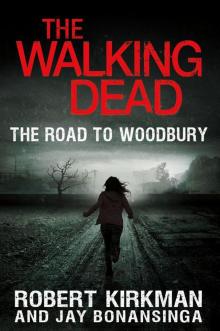 The Walking Dead: The Road to Woodbury
The Walking Dead: The Road to Woodbury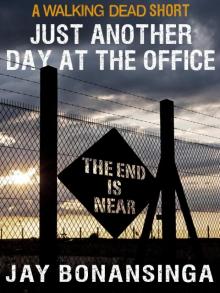 Just Another Day at the Office
Just Another Day at the Office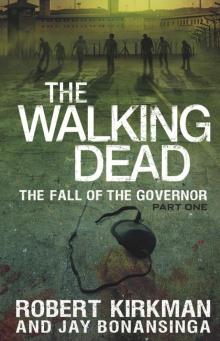 The Fall of the Governor: Part One
The Fall of the Governor: Part One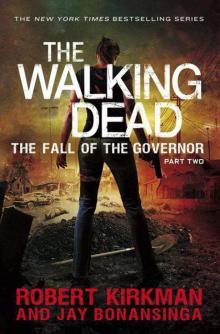 The Walking Dead: The Fall of the Governor: Part Two
The Walking Dead: The Fall of the Governor: Part Two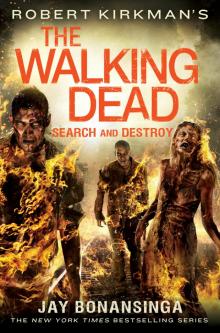 Search and Destroy
Search and Destroy Invasion
Invasion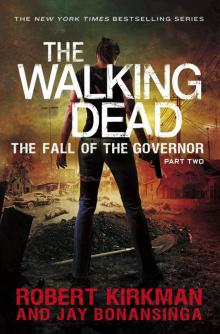 The Fall of the Governor: Part Two
The Fall of the Governor: Part Two The Walking Dead Collection
The Walking Dead Collection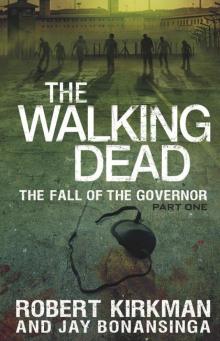 The Walking Dead
The Walking Dead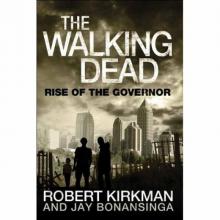 Descent
Descent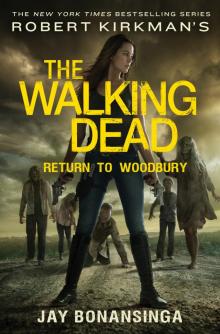 The Walking Dead: Return to Woodbury
The Walking Dead: Return to Woodbury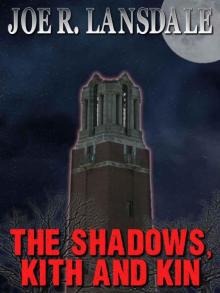 The Killer's Game
The Killer's Game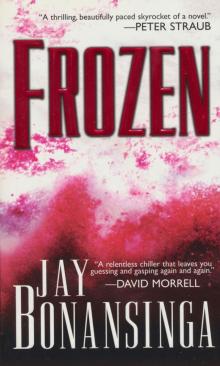 Frozen
Frozen Shattered
Shattered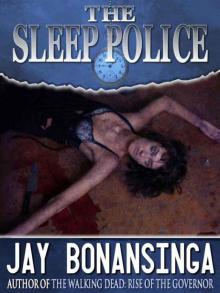 The Sleep Police
The Sleep Police Perfect Victim
Perfect Victim